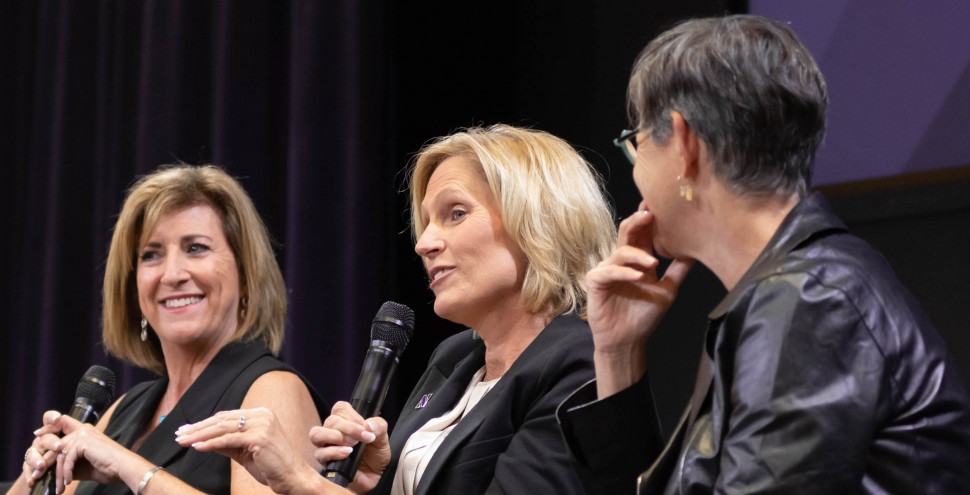When veteran sports reporter and Northwestern University Medill School lecturer Melissa Isaacson joined the Niles West High School girls’ basketball team in 1975, she was just trying to find where she fit in.
Four years later, the team was state champions and had built a tight-knit community. This pivotal experience inspired Isaacson’s latest book “State: A Team, A Triumph, A Transformation,” which tells the story of the team and what they overcame playing sports in the years after the passage of Title IX, the historic law that banned gender-based discrimination in public schools and other federally funded programs.
Isaacson, a lecturer at Northwestern’s Medill School of Journalism, Media, Integrated Marketing Communications, discussed her book at Medill on Oct. 11, joining a panel with former Northwestern basketball player Connie Erickson Brown (Communication ’84) and the First Lady of the City of Chicago, Amy Eshleman. The women explored the lifelong impact of playing basketball and other sports at the dawn of Title IX.
In attendance were current and former Niles West students, Chicago Sky owner Michael Alter and Mayor Lori Lightfoot, who gave opening remarks before the panel.
“[Title IX] has made a significant difference in generations of young girls who get the joy of playing sports,” Lightfoot said. “Just being out there on the field makes a huge difference in their confidence level and their respect for each other. It makes an enormous difference. We can never, never understate that.”
Isaacson’s book details the progress that had to be made to include women and girls in sports in the years after Title IX was passed. Isaacson and Erickson Brown, who were on the Niles West team together, recalled how in the early days, the team had to get to school at 4:30 a.m. to practice in the “boys’ gym” and the excitement of getting their first real uniforms.
“I can remember the squeak of the gym and the glass backboards and getting those first horrendous uniforms,” Isaacson said. “The uniforms were shared by every girls’ team in the school and I thought I was on the Olympic team. I couldn’t have been more excited going home that night with that horrendous uniform because it was a uniform. To represent your school — as a girl to do that — I get chills thinking about it still.”
Erickson Brown said she still remembers the feeling of belonging that she had playing basketball at Niles West and how it changed her life’s trajectory.
“It was more than just playing a game,” Erickson Brown said. “It was setting goals, working hard, being disciplined, working as a team and learning how to put other people ahead of yourself for the common good.”
After graduating from Niles West, Erickson went on to play basketball for Northwestern and later coached girls’ basketball teams.
Eshleman — who was on the first-ever Illinois girls’ basketball state champions, the 1977 Sterling High School “Golden Girls” — said the experience had a lifelong impact on her.
“I can’t imagine my life without that experience that I had in high school of being part of a team,” Eshleman said. “It is absolutely the reason I am who I am.”
Isaacson said the 15-year process of writing the book involved not only writing about her own experiences, but writing the stories of everyone involved with the team and their success.
“As journalists we were taught that we are not the story and we don’t write about ourselves, but this story needed to be told,” Isaacson said. “To be able to pay tribute to these women that I was surrounded by was just the greatest writing joy of my life. I don’t look at it as my book, I look at it as our story.”
This panel is part of a year of events and programming marking the 150th anniversary of coeducation at Northwestern. This year, the University is celebrating the women/womxn who have led the struggle to open doors to create greater access and opportunity for all who follow. Programming information and stories of individuals who are catalysts for change at Northwestern are available on the 150 Years of Women website.

